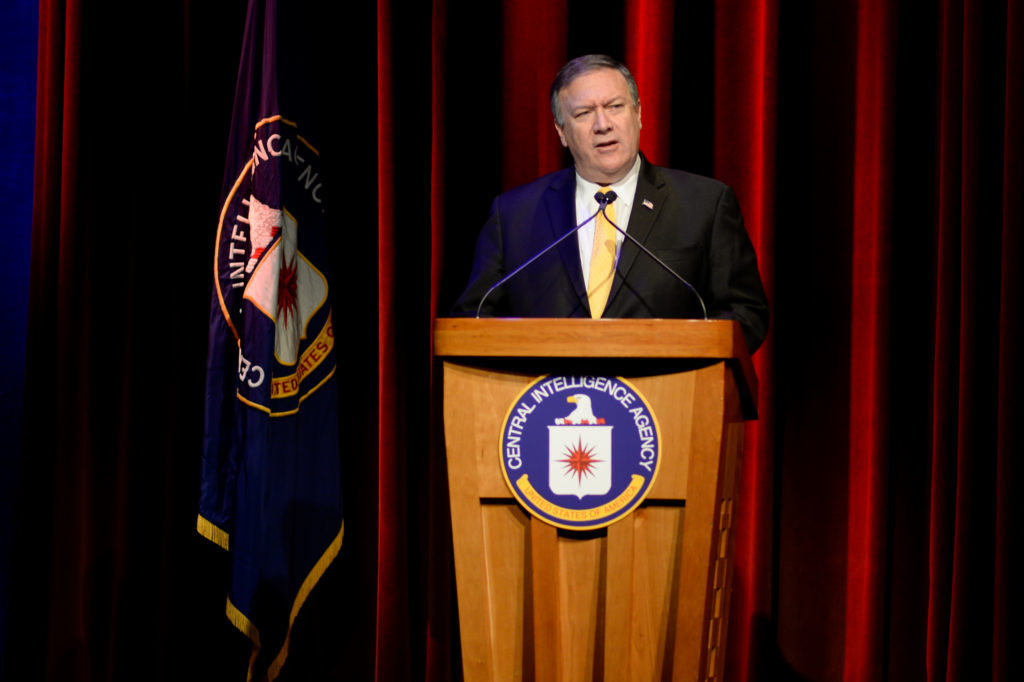The head of the CIA and a host of senior current and former intelligence officials came to Lisner Auditorium Wednesday for a conference about the state of the intelligence community.
The annual conference, hosted by GW’s Center for Cyber and Homeland Security and the CIA, returned to GW for the fourth time. Conversations ranged from the issues facing the Asian Pacific to the role of technology in intelligence agencies.
Here are three things you may have missed:
A fast intelligence agency
Mike Pompeo, the director of the CIA, opened the Ethos and Profession of Intelligence conference speaking about the importance of the intelligence community to U.S. national security and the need for intelligence agencies to have “speed and agility” in responding to threats.
“The size and complexity of our government, along with the need to coordinate efforts across organizational lines, and operating in a democracy make it harder for us sometimes to move as quickly as we’d like,” he said in a speech.
Pompeo said that because the structure of U.S. intelligence agencies is more formal than that of many authoritarian states, it requires officials to gain clearance and clear other processes that can slow agencies down. He said U.S. adversaries can often act impulsively while the U.S. typically carefully weighs foreign policy decisions.
“Many of our adversaries today are incredibly nimble, and they’re viciously fast when they’re deciding how they are going to attack America,” he said. “That poses immense challenges for institutions charged with helping our government defeat them.”
Threats to credibility
In a panel discussion, four former CIA directors discussed the state of the intelligence community in an era of fake news and public distrust.
Porter Goss, who served as director of the CIA in 2005 and 2006, said in a period of “post-truths” where nearly everything is politicized, it is difficult for the intelligence community to gain enough credibility with the public to be viewed as an accurate source of information.
“Now what happens when you don’t have truth?” Goss said. “You don’t have a lot of trust, and you don’t get a lot of things done.”
[gwh_image id=”1039747″ credit=”Lillian Bautista | Hatchet Photographer ” align=”none” size=”embedded-img”]Former CIA Directors John Brennan, Michael Hayden, Peter Goss and William Webster discuss threats facing the intelligence community at a panel discussion Wednesday.[/gwh_image]
John Brennan, who served as the director of the CIA from 2013 to 2017, said the public should respect the intelligence community as a non-partisan entity.
“The trust and confidence of the American people in the intelligence community and intelligence professionals would be stronger if the first customers of the intelligence community were accepted unambiguously,” he said.
An era of leaks
A panel made up of two members of the intelligence community and a civil liberties advocate discussed the balance between transparency and secrecy.
Alexander Joel, the chief of the Office of Civil Liberties, Privacy and Transparency – part of the Office of the Director of National Intelligence – spoke about the risks that uncontrolled transparency can bring for intelligence agencies.
“I think what most harms the intelligence community is what I would think of as ‘unplanned transparency,’ when there is an unauthorized disclosure of information and a lot of information goes out to the world without appropriate reviews and controls. That can really be extremely damaging to national security,” Joel said.
Elizabeth Goitein, the co-director of the liberty and national security program at the Brennan Center for Justice, pushed back on the notion of intelligence officials policing themselves.
“Protecting civil liberties is always going to be a secondary consideration for intelligence agencies,” she said. “It’s never going to be the primary consideration – that’s not their mission, that’s not what they’re focused on.”





